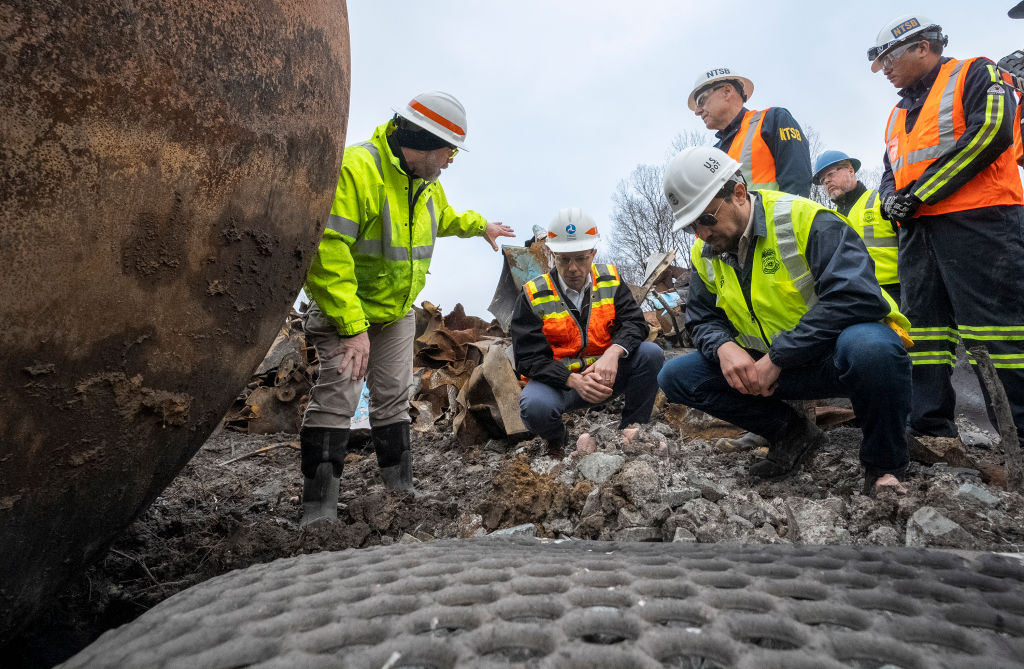The East Palestine Blame Game
Happy Friday! Ben, an Andean bear at the St. Louis Zoo, busted out of his habitat yesterday for the second time this month, only to be found and tranquilized a few hours later. Give the guy a break—he was clearly just trying to support his friend from theater camp by going to see his new movie on opening night.
Quick Hits: Today’s Top Stories
- South Africa, China, and Russia are engaging in trilateral naval exercises off the coast of South Africa this week that South Africa—which abstained from a United Nations vote last year condemning Russia’s invasion of Ukraine—labeled “routine.” Contrary to initial reports, a senior Russian naval officer said Wednesday Russia will not test its “Zircon” hypersonic missile during the exercises.
- China’s Ministry of Foreign Affairs issued a bulletin this morning calling for a cease-fire between Russia and Ukraine, as well as the protection of nuclear power plants, resumption of peace talks, and the abandonment of a “Cold War mentality.” The outline does not address what should be done with the land Russia has seized in eastern Ukraine, and it reportedly comes as China is weighing whether to provide lethal aid to Russia. The Biden administration reportedly believes China may already be providing nonlethal military aid to Russia, prompting a spokesperson for the Chinese Foreign Ministry to lash out at the United States for commenting on Chinese-Russian relations.
- The European Commission announced Thursday that beginning next month, thousands of EC officials and staffers will be prohibited from downloading TikTok onto both their work-issued devices and personal devices enrolled in the EC’s mobile device service. “This measure aims to protect the Commission against cybersecurity threats and actions which may be exploited for cyber-attacks against the corporate environment of the Commission,” the body wrote.
- President Joe Biden announced Thursday he is nominating Ajay Banga—the former head of MasterCard—to lead the World Bank. David Malpass, the bank’s current president, announced last week he would step down in late June, months before his term was set to expire. The bank’s board will have to officially appoint Banga, and it’s yet unclear if any other country will nominate someone to the role historically filled by the U.S.
- Members of the Republican National Committee voted Thursday to hold the party’s first presidential primary debate in Milwaukee in August, with RNC Chairwoman Ronna McDaniel emailing committee members the final criteria for being included in the debate has not yet been decided. Milwaukee will also host the Republican National Convention next year.
- The Department of Labor reported Thursday that initial jobless claims—a proxy for layoffs—decreased by 3,000 week-over-week to a seasonally-adjusted 192,000 claims last week, suggesting the labor market remains historically tight.
Sifting Through the Noise in East Palestine

At a Tuesday roundtable in East Palestine, Ohio, a train whistle threatened to drown out Environmental Protection Agency Administrator Michael Regan as he explained the official response to the derailment of a Norfolk Southern train earlier this month and resulting toxic chemical spill. As residents began to run through concerns—an 8-year-old child coughing constantly, a deli losing business because no one wants to buy chicken that smells of butyl acrylate—a train rattled along the tracks.
Since we last wrote to you about the February 3 derailment a week and a half ago, frustrations over the spill and controlled burn of toxic chemicals have only grown—as have political pot-shots and calls for regulatory changes only marginally connected to the actual accident. While Republican lawmakers and the Biden administration trade barbs over each others’ track records on railway regulation, East Palestine residents are still navigating the spill’s fallout.
In 2021, according to the Federal Railroad Administration, trains operated by the seven major freight railroads derailed 868 times—but most of these accidents occur in rail yards where they don’t make headlines. Though 868 derailments in one year may sound like a lot, the figure represents a marked improvement from the late 20th century: According to federal data analyzed by the Eno Center for Transportation, rail safety incidents have dropped 60 percent since 1990. Plus, when it comes to transmitting hazardous material, trains are far safer than the primary alternative. Trucks carry a little more than twice as much hazardous material as trains per ton-mile, but there were 22,000 hazmat-related incidents on highways in 2021 and just 378 along railways. Since 2010, highway-related hazmat accidents have killed 103 people, while rail-related accidents have killed one.